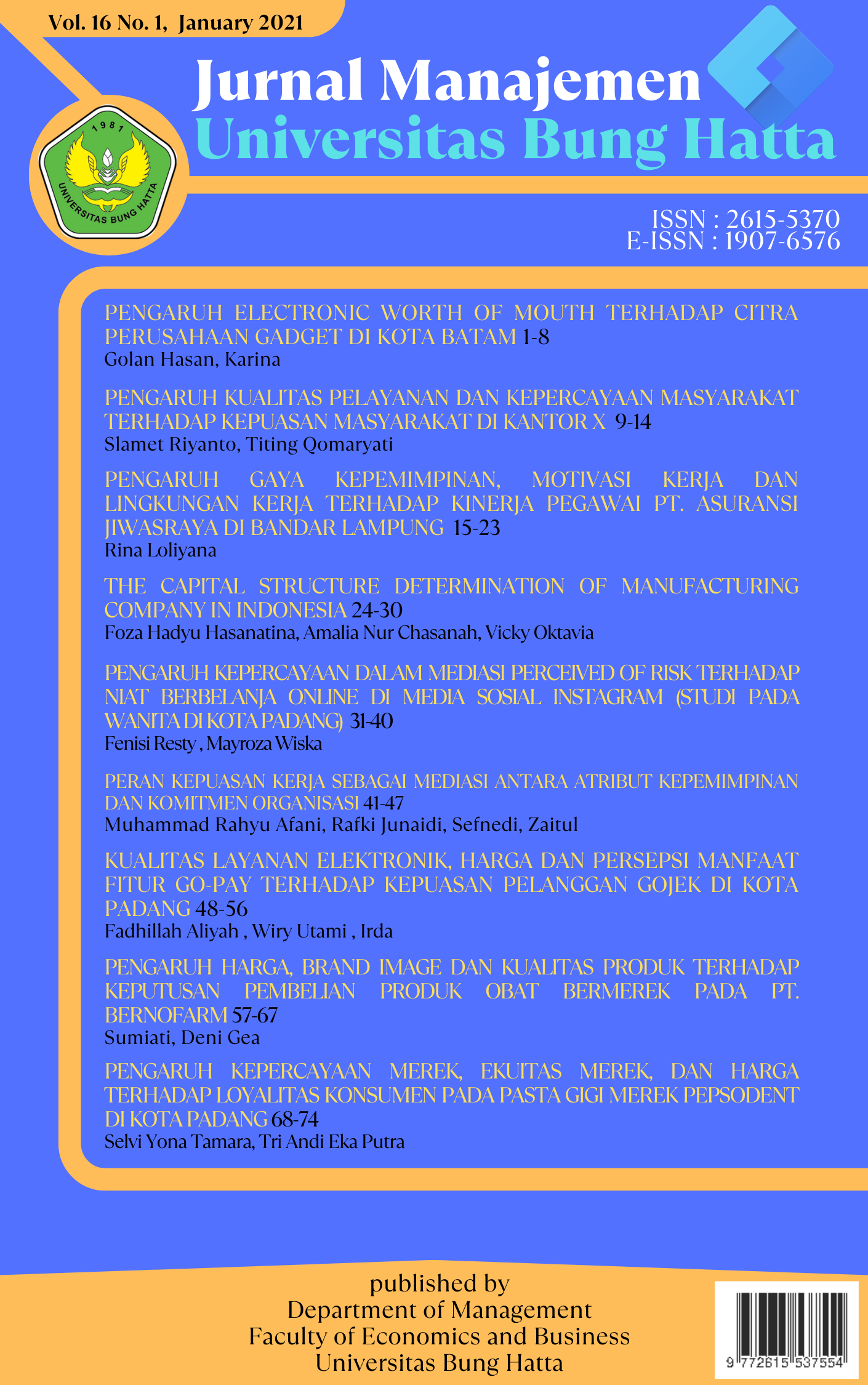PERAN KEPUASAN KERJA SEBAGAI MEDIASI ANTARA ATRIBUT KEPEMIMPINAN DAN KOMITMEN ORGANISASI
DOI:
https://doi.org/10.37301/jmubh.v16i1.18344Abstract
Research on leadership attributes in influencing organizational commitment with job satisfaction as an intervening variable at PT. Mutiara Agam Palm oil processing with respondents of all employees totaling 39 people, with the result that the Leadership Attribute has a positive effect on Job Satisfaction and Job Satisfaction has no effect on Organizational Commitment, subsequently the Leadership Attribute has a positive effect on Organizational Commitment and Job Satisfaction does not mediate the relationship between Leadership Attributes and Organizational Commitment.
References
Abdul Rashid, Z., Sambasivan, M. and Johari, J. (2003), “The influence of corporate culture and organizational commitment on performance”, Journal of Management Development, Vol. 22 No. 8, pp. 708-728.
Alas, R. and Edwards, V. (2006), “Work-related attitudes in Finno-Ugrian countries: Estonia, Finland and Hungary”, AIB-SE (USA) 2006 Annual Meeting, Clearwater Beach, FL, October 25-27.
Babin, B. J., & Anderson, R. E. (2014).on Multivariate Data Analysis Joseph F . Hair Jr .William C. Black Seventh Edition.
Benkhoff, B. (1997), “Disentangling organizational commitment: the dangers of the OCQ for research and policy”, Personnel Review, Vol. 26 Nos 1/2, pp. 114-131.
Bhuian, S.N. and Islam, M.S. (1996), “Continuance commitment and extrinsic job satisfaction among a novel multicultural expantriate workforce”, Mid-Atlantic Journal of Business, Vol. 32 No. 1, pp. 35-46.
Chen, Y.J. (2007), “Relationships among service orientation, job satisfaction, and organizational commitment in the international tourist hotel industry”, Journal of American Academy of Business, Vol. 11 No. 2, pp. 71-82.
Cheung, H.Y. and Chan, A.W.H. (2010), “Education and competitive economy: how do cultural dimensions fit in?”, Higher Education, Vol. 59 No. 5, pp. 525-541.
Ebrahimian Jolodar, S.Y. (2012), “An investigation of social factors affecting on personnel job satisfaction of remedial service insurance department”, Iranian Journal of Management Studies (IJMS), Vol. 5 No. 1, pp. 97-110.
Heryadi.2014. Pengaruh Kepemimpinan Transformasional dan Transaksional terhadap Komitmen Organisasional dengan Kepuasan Kerja sebagai Variabel Intervening.Jurnal Ilmu Ekonomi dan Sosial.Jilid 2 No.3 Hal.276-285.
Ineson, E.M., Benke, E. and Laszlo, J. (2013), “Employee loyalty in Hungarian hotels”, International Journal of Hospitality Management, Vol. 32, pp. 31-39.
Karia, N. and Asaari, M.H.A.H. (2006), “The effects of total quality management practices on employees’ work-related attitudes”, The TQM Magazine, Vol. 18 No. 1, pp. 30-43.
Karia, N., Asaari, H.A.H.M. (2019) "Leadership attributes and their impact on work-related attitudes", International Journal of Productivity and Performance Management, https://doi.org/10.1108/IJPPM-02-2018-0058.
Lam, D. and Ozorio, B. (2012), “Linking employee’s personalities to job loyalty”, Annals of Tourism Research, Vol. 39 No. 4, pp. 2203-2206.
Meyer, J.P., Stanley, D.J., Herscovitch, L. and Topolnytsky, L. (2002), “Affective, continuance, and normative commitment to the organization: a Meta-analysis of antecedents, correlates, and consequences”, Journal of Vocational Behavior, Vol. 61 No. 1, pp. 20-52.
Neubert, M.J., Carlson, D.S., Kacmar, K.M., Roberts, J.A. and Chonko, L.B. (2009), “The virtuous influence of ethical leadership behavior: evidence from the field”, Journal of Business Ethics, Vol. 90 No. 2, pp. 157-170.
Porter, L.W., Steers, R.M., Mowday, R.T. and Boulian, P.V. (1974), “Organizational commitment, job satisfaction, and turnover among psychiatric technicians”, Journal of Applied Psychology, Vol. 59 No. 5, pp. 603-609.
Rahiman, H.U. and Kodikal, R. (2017), “Impact of employee work related attitudes on job performance”, British Journal of Economics, Finance and Management Sciences, Vol. 13 No. 2, pp. 93-105.
Sefnedi, Antoni dan Doni, A. (2020), “Peran kepuasan kerja sebagai mediasi antara kepemimpinan transformasional, stres kerja dan komitmen organisasi”, Kinerja-pISSN:1907-3011,eISSN:2528-1127.
Spell, H.B., Eby, L.T. and Vandenberg, R.J. (2014), “Developmental climate: a cross-level analysis of voluntary turnover and job performance”, Journal of Vocational Behavior, Vol. 84 No. 3, pp. 283-292.
Testa, M.R. (2001), “Organizational commitment, job satisfaction, and effort in the service environment”, The Journal of Psychology, Vol. 135 No. 2, pp. 226-236.
Top, M., Akdere, M. and Tarcan, M. (2015), “Exploring the impacts of employee advocacy on job satisfaction and organizational commitment: case of Taiwanese airlines”, Journal of Air Transport Management, Vol. 36, pp. 94-100.
Williams, L.J. and Hazer, J.T. (1986), “Antecedents and consequences of satisfaction and commitment in turnover models: a re-analysis using latent variable structural equation methods”, Journal of Applied Psychology, Vol. 71 No. 2, pp. 219-231.
Yates, L.A. (2014), “Exploring the relationship of ethical leadership with job satisfaction, organizational commitment, and organizational citizenship behaviour”, The Journal of Values-Based Leadership, Vol. 7 No. 1, pp. 1-15.
Downloads
Published
Issue
Section
License
Copyright (c) 2021 Muhammad Rahyu Afani, Rafki Junaidi, Sefnedi, Zaitul

This work is licensed under a Creative Commons Attribution-ShareAlike 4.0 International License.
Authors who publish with Jurnal Manajemen Universitas Bung Hatta agree to the following terms:
- Authors retain copyright and grant the journal right of first publication with the work simultaneously licensed under a Creative Creative Commons Attribution-ShareAlike 4.0 International License that allows others to share the work with an acknowledgement of the work's authorship and initial publication in Jurnal Manajemen Universitas Bung Hatta.
- The author holds the copyright of the submitted and published articles, with the understanding that articles are disseminated under the Creative Commons Attribution-ShareAlike 4.0 International License..
- The editor team is entitled to do the editing in accordance with the guidelines for writing or template in the Jurnal Manajemen Universitas Bung Hatta.
This work is licensed under a Creative Commons Attribution-ShareAlike 4.0 International License.












